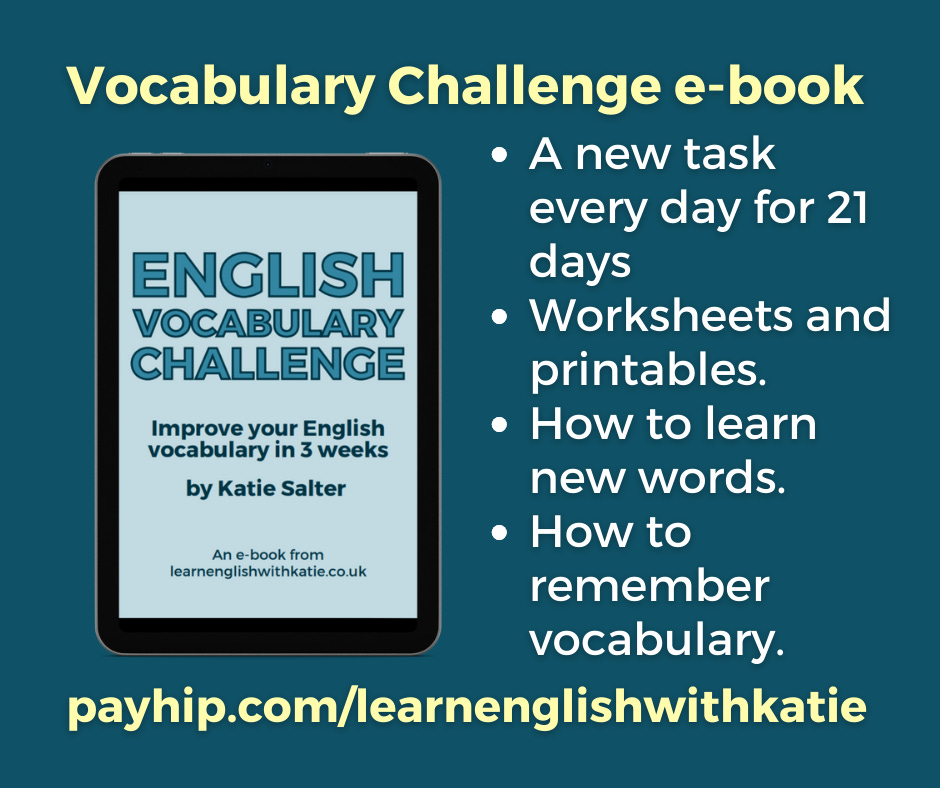"I forget words when I speak"
Why this happens and how to fix it

Hello!
“When I’m speaking English, I forget the words! What can I do?”
This is something I hear from English learners a lot.
If this is you, don’t worry! This is very common and you’re not alone. There’s certainly nothing wrong with you!
Why does this happen?
The reasons aren’t the same for everyone but I think there are three main reasons for this problem:
1. You haven’t fully learnt the words yet.
Has this happened to you? You learn 10 new words one day… and the next day, you can’t even remember 50% of them.
You need to see and use a word quite a few times before you can remember it. Once is definitely not enough, most of the time.
Maybe you can’t remember the word you want simply because you don’t know it well enough yet.
2. The words are not automatic for you yet.
You’ll find that some words come automatically - you can say them without having to search your mind or translate in your head. But other words are more difficult to remember, especially when you’re speaking.
Speaking involves doing a lot of different things all at once - listening to the question, thtinking how to answer, finding the right words, thinking about the grammar, pronunciation and more. Sometimes, you just don’t have time to find the words you want!
Also, you probably know a lot of words when you read or hear them but you don’t use them when you speak. These words are in your passive vocabulary but they aren’t part of your active vocabulary yet.
3. Fear
Another reason is you’re so nervous when you speak that your brain freezes and you can’t find the words. This makes you even more nervous and that makes the problem even worse!
This happens to me in my own language when I’m nervous! It happens even more when I’m trying to speak a second language!
A lot of learners find speaking English a bit scary and the words they know just seem to disappear from their minds!
What’s the answer?
Even though the problem has different causes, I think the answers to all these problems are mostly the same.
1. Practise speaking
The more you practise speaking, the more automatic it will become. When you practise, it gets easier to find the words you need.
Your fear will also get less and less every time you practise.
2. Review
When you find new words which you think will be useful to remember, write them down and review them again the next day. And maybe the day after that too. And a week later.
This way, you’ll remember 90% or 100% of the words, not just 50%.
3. Use the new words
It’s important to use new words if you want to remember them.
Use the words that are in your passive vocabulary as well until they become part of your active vocabulary.
You can try to use the words in conversation. It’s great when this happens. But what if the words you want to remember just don’t come up in today’s conversation? What can you do about that?
Don’t wait until you need the words. Use them on your own during your study time. How? One thing I suggest is to make your own example sentences.
Dictionaries give you example sentences but it’s much better if you can create your own. This will help the word stick in your memory.
If you can, personalise your sentences. Write sentences that are true for you.
4. Reading and listening
Read and listen to English as often as you can. The more you do this, the more you’ll see and hear useful words again and again.
This will help you to remember them and move them from passive to active vocabulary. We need to hear or see a word several times before it stays in our memory.
5. Relax
If fear is your problem, then my final tip is to try to relax! Take a breath. Remember that this is normal. Stay calm and maybe the words will come. If they don’t, you can probably find another way to say the same thing.
Find people to talk to that make you feel calm and comfortable. People who won’t trust you. This could be a friend you practise with or a teacher. This will make it easier when you have to speak in a more pressured situation.
If you’d like more tips for learning vocabulary, you might like my “Vocabulary Challenge” e-book. This e-book is full of tips and strategies for learning new words and for keeping them in your head! Find out more here:
Let me know how your vocabulary learning goes over the next few days!
See you next week.
Katie 💙
PS These Friday emails are free for everyone but you also have the option to upgrade to paid.
Paying subscribers get:
💙 full access to my library of grammar, vocabulary and reading lessons - new lessons are added each month.
💙 an invitation to join a monthly Zoom call so you can practise your English in a small, friendly group, ask me questions, and get direct feedback on your English.
💙 and maybe a few other surprise bonuses!
All this for just £6 a month!


